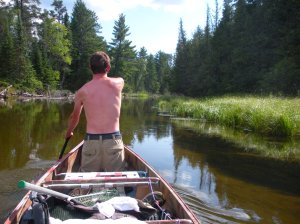Ethical Paddling with Leave No Trace Principals
If you’ve spent time on a busy section of river corridor, then you’ve pulled up on a seemingly pristine stretch of bank overhung by weeping branches and stretched your legs as you pull on those nice sandals only to find a big old pile of unburied human poop.
Okay, maybe it was just the leftover remnants of an improvised fire ring left from the night before by some frat boys out for a good time.
Either way, as outdoor leaders and educators, it’s our job to uphold ethical backcountry travel guidelines and to make sure we teach these to our students and our friends.
Not familiar with LNT? Start here with the 7 LNT Principles.
Here’s the three most important LNT Principles as I feel they pertain to paddling:
Dispose of Waste Properly
Nothing gets my paddling hackles up so much as finding poor stewardship of our natural resources and public waterways.
Take an extra bag with you next time you paddle and pack out some trash. Hopefully others will see you setting this good example.
Make sure you take a trowel for proper human waste disposal even on short trips. You never know when you’ll have to go and every time counts. Don’t make the next kayaker have to step in it.

Paddling a stretch of the Au Sable River in Michigan
Need up to date suggestions and reviews on equipment that can help you haul your paddling gear, food, and waste in to and out of the backcountry? Try checking out Paddle Pursuits.
Minimize Campfire Impacts
If you find an improvised fire ring (non-established) then teach those you’re traveling with why it’s so important to only use established fire circles. Depending on what land you’re using (National Park, National Forest, Wilderness Area, etc.) it can actually be illegal to create your own fire rings.
Using established fire rings keeps the destructive impact of wilderness campfire isolated in a single location. Unless you’re traveling in very remote backcountry and need a fire while you’re kayaking please stick to established rings.
Minimizing campfire impact also means completely burning any wood that you start to combust entirely to ashes and covering the ashes or disbursing them. A great rule of thumb is to burn sticks no larger than your wrist or longer than your arm.
For a few more tips on how this LNT principle applies to paddling you can check out this article.
Be Considerate of Other Visitors
This one gets overlooked so easily! For some reasons waterways tend to be one of the first destinations for rowdy and inconsiderate backcountry travelers. Bachelor parties, tubers, and other variously intoxicated paddlers seem to flock in droves to loudly make chaos and leave trash scattered about like a hurricane.
Always remember that other people are enjoying the natural resources and public lands. On waterways your voice travels quite well so keep it down.
Set up your tent and campsite well out of view from the water. Ruining visual corridors with the trendy bright neon colors used in tents and equipment right now is often overlooked. Allow others to enjoy the same undistracted view of the beautiful and wild waterways you enjoyed before setting up camp.
On the same note, respect those less considerate users of the recreational waterways but if presented the opportunity perhaps you can try to talk to them about why it’s so important to become LNT aware.
How to Teach LNT Principles
It’s important to remind people that LNT principles are guidelines and that not every situation requires the same approach. When teaching LNT I always start by asking the group to contribute their opinions about public land use and resource management. With children this is often a facilitated discussion where you’ll want to make the language digestible and appealing.
Naturally the discussion can flow into how LNT principles help us provide the framework through which to teach ethical recreational use of public and natural lands.
Check out the LNT website for LNT teaching resources and courses to become an LNT Trainer.
Take the LNT Online Awareness Workshop to see if you’re familiar with ethical backcountry travel guidelines.
Leave no trace principles are guidelines to help ensure the waterways we enjoy recreationally and professionally are kept pristine for future outdoor enthusiasts. Let’s spread the awareness!
